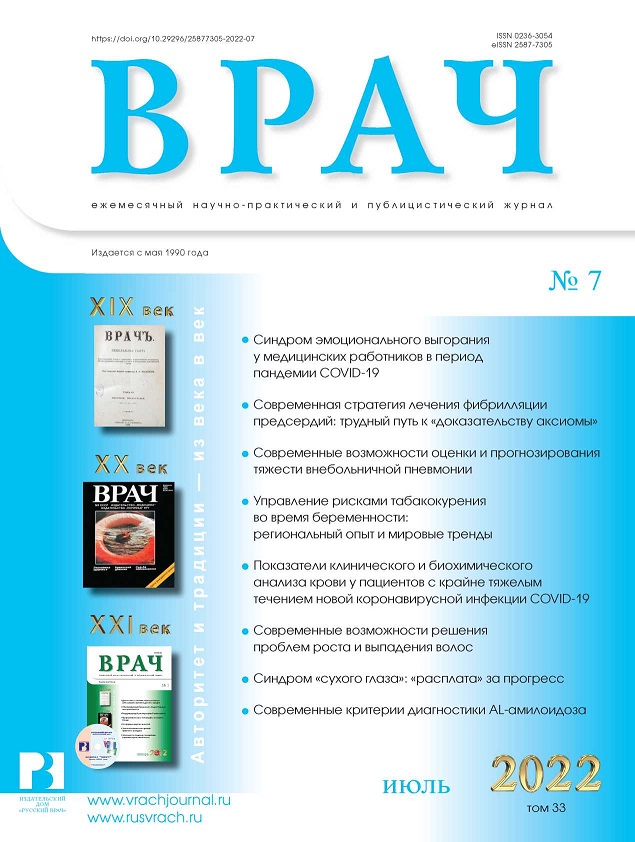Синдром эмоционального выгорания у медицинских работников в период пандемии COVID-19
- Авторы: Бабанов С.А.1, Острякова Н.А.1, Стрижаков Л.А.2, Агаркова А.С.1, Лотков В.С.1
-
Учреждения:
- Самарский государственный медицинский университет Минздрава России
- Первый МГМУ им. И.М. Сеченова Минздрава России (Сеченовский Университет)
- Выпуск: Том 33, № 7 (2022)
- Страницы: 5-9
- Раздел: Актуальная тема
- URL: https://journals.eco-vector.com/0236-3054/article/view/114644
- DOI: https://doi.org/10.29296/25877305-2022-07-01
- ID: 114644
Цитировать
Полный текст
Аннотация
Пандемия новой коронавирусной инфекции (НКИ) способствовала развитию кризисов в области экономики, образования, политики и здравоохранения. Медицинские работники оказались наиболее уязвимой категорией населения по риску развития профессионального выгорания (ПВ). Дополнительные проблемы, с которыми столкнулся медицинский персонал, способствовали многократному увеличению нагрузки на специалистов-медиков, а также увеличили восприимчивость к стрессу и ПВ. Цель. Определить основные факторы профессионального риска и изучить показатели ПВ среди медицинского персонала различных учреждений (COVID-госпитали, амбулаторно-поликлиническое звено - АПЗ, многопрофильные стационары) во время пандемии COVID-19. Материал и методы. Опрос проведен среди медицинского персонала COVID-госпиталей (n=201), АПЗ (n=186), многопрофильных стационаров (n=195), а также у контрольной группы (n=190). Для исследования синдрома ПВ использовали опросник Maslach Burnout и анкетирование, позволяющее оценить отношение медицинских работников к сложившейся обстановке в период распространения пандемии COVID-19. Результаты. По данным опросника Maslach Burnout, медицинские работники, независимо от места работы, имели повышенный риск ПВ. При этом у медицинского персонала COVID-госпиталей были достоверно более высокими показатели «Профессиональное истощение» и «Деперсонализация» по сравнению с медицинским персоналом многопрофильных стационаров (p≤0,001) и АПЗ (p≤0,001). В то же время у медицинского персонала COVID-госпиталей наблюдался достоверно более низкий показатель по категории «Редукция личных достижений» по сравнению с таковым у медицинского персонала других учреждений. Кроме того, выявлены основные факторы профессионального риска, влияющие на психологическое здоровье и ПВ медицинских работников во время распространения пандемии COVID-19: организационный фактор; угроза и риск заражения; стигма и социальная изоляция. Заключение. Сравнительный анализ показал, что все исследуемые группы медицинских работников имеют по данным опросника Maslach Burnout повышенные показатели ПВ. При этом у медицинского персонала COVID-госпиталей отмечены достоверно более высокие показатели по категориям «Профессиональное истощение», «Деперсонализация» и более низкие значения показателя по категории «Редукция личных достижений» по сравнению с таковым у медицинского персонала других учреждений. Лечение пациентов с НКИ подвергает персонал ряду специфических факторов риска, связанных с уходом за инфицированными пациентами, а также с существенными изменениями в работе, связанными с организацией и безопасностью лечебного процесса в условиях пандемии, которые способствуют увеличению стресса и ПВ.
Ключевые слова
Полный текст
Об авторах
С. А. Бабанов
Самарский государственный медицинский университет Минздрава России
Автор, ответственный за переписку.
Email: s.a.babanov@mail.ru
доктор медицинских наук, профессор
Н. А. Острякова
Самарский государственный медицинский университет Минздрава России
Email: s.a.babanov@mail.ru
Л. А. Стрижаков
Первый МГМУ им. И.М. Сеченова Минздрава России (Сеченовский Университет)
Email: s.a.babanov@mail.ru
доктор медицинских наук, профессор
А. С. Агаркова
Самарский государственный медицинский университет Минздрава России
Email: s.a.babanov@mail.ru
В. С. Лотков
Самарский государственный медицинский университет Минздрава России
Email: s.a.babanov@mail.ru
доктор медицинских наук, профессор
Список литературы
- Форманюк Т.В. Синдром эмоционального сгорания как показатель профессиональной дезадаптации учителя. Вопросы психологии. 1994; 6: 57-63.
- Бойко В.В. Синдром «эмоционального выгорания» в профессиональном общении: Учебное пособие. СПб: Питер, 2015; 300 с.
- Ронгинская, Т.И. Синдром выгорания в социальных профессиях. Психологический журнал. 2002; 23 (3): 85-95.
- Водопьянова Н.Е., Старченкова Е.С. Синдром выгорания: диагностика и профилактика. СПб: Питер, 2016; 258 с.
- Freudenberger H.J. Staff burn-out. Journal of Social Issues. 1974; 30: 159-65. doi: 10.1111/j.1540-4560.1974.tb00706.x
- Li Q., Guan X., Wu P. et al. Early Transmission Dynamics in Wuhan, China, of Novel Coronavirus-Infected Pneumonia. N Engl J Med. 2020; 382: 1199-207. doi: 10.1056/NEJMoa2001316.PMID: 31995857
- Bousquet J., Zuberbier T., Anto J.M. et al. Cabbage and fermented vegetables: from death rate heterogeneity in countries to candidates for mitigation strategies of severe COVID-19. Allergy. 2021; 76 (3): 735-50. doi: 10.1111/all.14549
- Azoulay E., De Waele J., Ferrer R., et al. & ESICM. Symptoms of burnout in intensive care unit specialists facing the COVID-19 outbreak. Ann Intensive Care. 2020; 10(1): 110. doi: 10.1186/s13613-020-00722-3
- Kisely S., Warren N., McMahon L. et al. Occurrence, prevention, and management of the psychological effects of emerging virus outbreaks on healthcare workers: rapid review and meta-analysis. BMJ. 2020; 369: m1642. doi: 10.1136/bmj.m1642
- Петриков С.С., Холмогорова А.Б., Суроегина А.Ю. и др. Профессиональное выгорание, симптомы эмоционального неблагополучия и дистресса у медицинских работников во время эпидемии COVID-19. Консультативная психология и психотерапия. 2020; 28 (2): 8-45. doi: 10.17759/cpp.2020280202
- Maslach C., Jackson S.E. Maslach Burnout Inventory Manual, 2nd ed. Consulting Psychologists Press: Palo Alto, CA, USA, 1986.
- Maslach C., Jackson S.E., Leiter M.P. Maslach Burnout Inventory Manual, 3rd ed. Consulting Psychologists Press: Palo Alto, CA, USA, 1996.
- Giusti E.M., Pedroli E., D’Aniello G.E. et al. The Psychological Impact of the COVID-19 Outbreak on Health Professionals: A Cross-Sectional Study. Front Psychol. 2020; 11: 1684. doi: 10.3389/fpsyg.2020.01684
Дополнительные файлы







